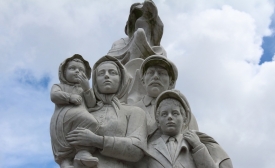international migration

Tara Ornstein writes about a new humanitarian diplomacy initiative that documents the scores of migrants who go missing each year.

Tara Ornstein debunks a few of the myths surrounding migration.
In addition to being the world’s leading donor of humanitarian aid, we have worked to ensure the rights of conflict victims – including women and girls, the elderly, the disabled, minorities, and LGBTI persons – are respected. We have also backed efforts to use both humanitarian and development resources to help societies that host large numbers of refugees so their citizens do not suffer from overburdened hospitals and overcrowded classroom
After more than 1.1 million refugees from troubled lands [...] have trekked into Germany over the last 13 months, a small but growing number are heading home. The reasons are myriad, but include overcrowded refugee centers, exasperating bureaucracy, unfamiliar German food, a lack of jobs and a spreading sense of resentment from Germans who fear their country is being overrun by Muslims.
Social media does more than share information about Syrian refugees; it offers ways you can help them. Here are five ways that highlight how social media supported Syrian refugees in the past year.
In late 2015, “Stephen K.” of the United States created a petition asking that the Greek islanders who have been helping refugees receive the Nobel Peace Prize “for their contributions aiding the refugee crisis.” The Greek isles [...] have been key points in the perilous journeys of [...] refugees who entered Europe in 2015, and many local people have volunteered to help these travelers as they come ashore, in need.
Refugees stranded at the Greece-Macedonia border have stripped down and sewn their lips together to protest against the restrictions placed on their movement. A group of Moroccans, Iranians and Pakistanis, stranded by a policy employed by Balkan states to filter the flow of people passing through the region, blocked rail traffic and demanded passage to Western Europe on Monday.
Elio Alvarez and Lideisy Hernandez [...] joined the largest migration from their homeland in decades. Buying two smartphones for $160 apiece […] they plugged themselves into a highly organized, well-funded […] effort to make human traffickers obsolete by using smartphones and messaging apps on much of the 3,400-mile (5,500-kilometer) overland journey [...] to the U.S.







